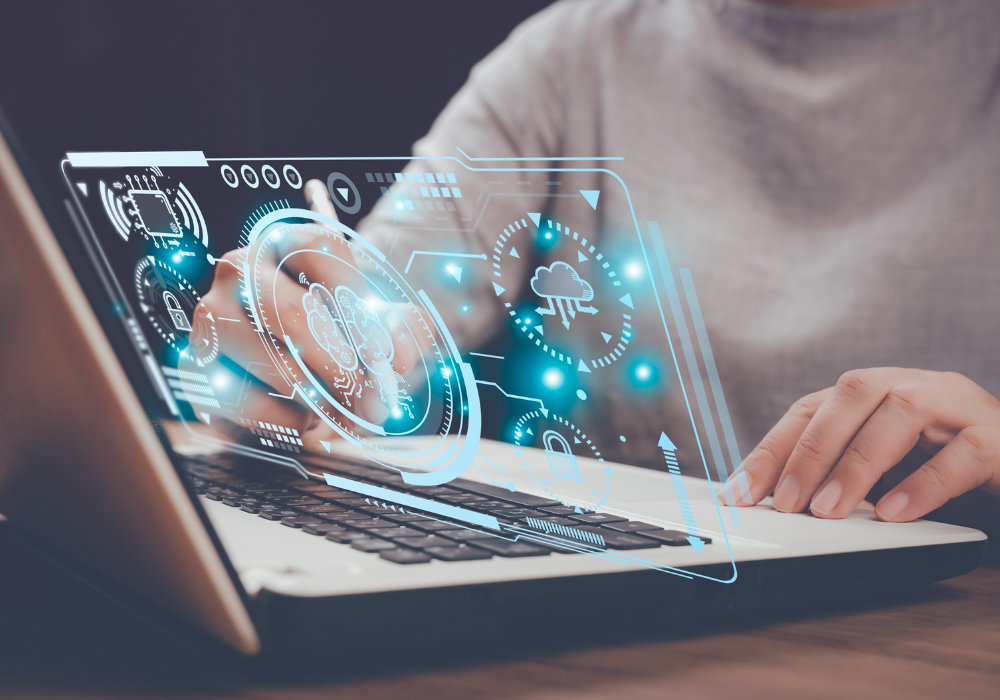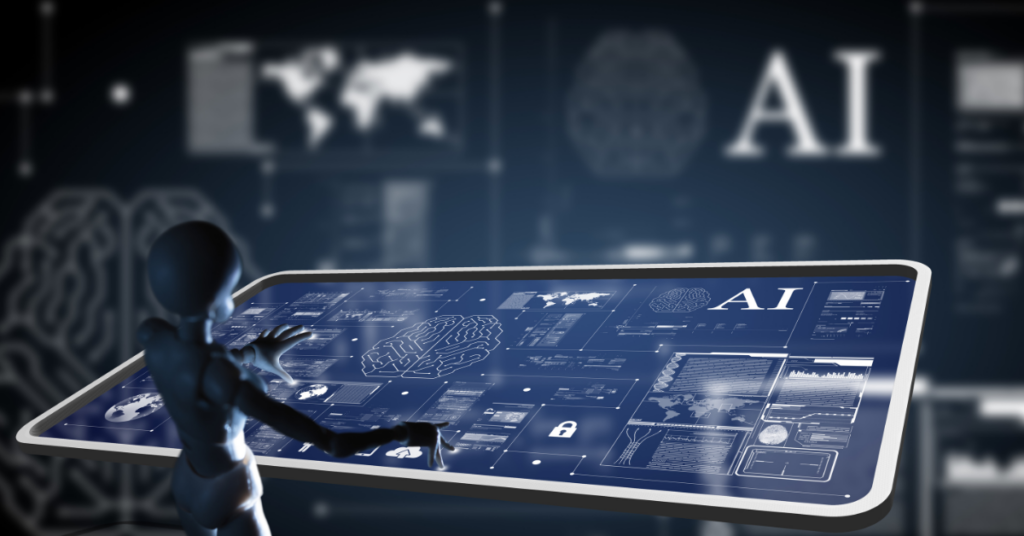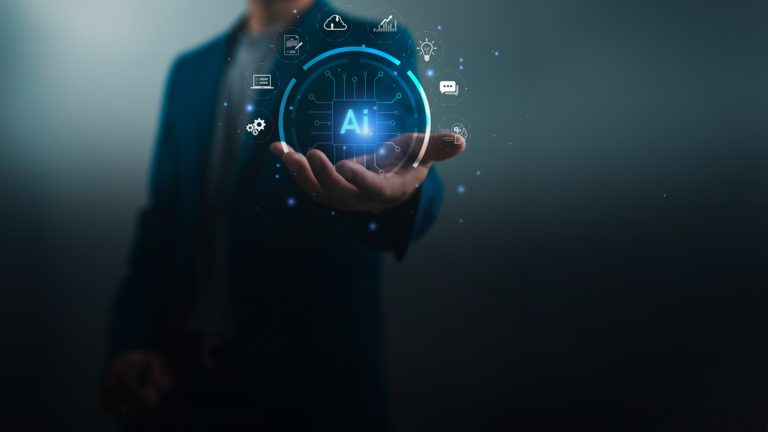Make Way for AI: Top 10 Applications That are Reshaping Industries

It is hard to miss AI’s significance in rapidly amplifying and reshaping industries as it transforms operations and redefines human interaction with technology. From revolutionizing healthcare diagnostics to propelling autonomous vehicles, each of these facets of AI reveals the myriad applications of artificial intelligence in today’s world. Moreover, regarding numbers, the global AI market surged to $136.55 billion in 2022; this trajectory is bound to continue with a projected compound annual growth rate of 37.3% from 2023 to 2030. That being said, join us as we navigate the many applications of artificial intelligence and its impact on industries.
ALSO READ: Human Intelligence vs. Artificial Intelligence: What are the Top Differences?
10 Best Applications of AI With Examples
 1. AI Content
1. AI Content
First and foremost, let’s talk about AI content generation: When powered by Machine Learning (ML) and Natural Language Processing (NLP), it helps automate text creation. For example, consider OpenAI’s GPT-3, a deep learning model that’s at the forefront of creating coherent and contextually relevant content. Another instance is ContentShake, which generates SEO-friendly blog post ideas, outlines, and text.
2. Guides
Then there are the AI-powered guides. These, too, utilize NLP and ML to offer personalized advice. One notable example is Indeed’s career companion; it leverages AI to analyze user profiles, providing tailored job recommendations and interview strategies. Moreover, this fusion of AI and career guidance reshapes how individuals navigate their professional paths.
3. AI Art
Another of those significant applications of artificial intelligence happens to be in the world of AI-generated art. It represents a harmonious blend of technology and creativity by utilizing deep learning and computer vision. Algorithms such as DeepDream—a manifestation of AI’s potential—transform ordinary images into captivating artworks, redefining artistic expression. Consequently, this synergy between human imagination and AI innovation pushes the boundaries of visual arts even further.
4. Health-Care Diagnostics
Artificial intelligence applications in healthcare harness advanced technologies such as AI and medical diagnosis techniques. IBM Watson for Oncology is a prime example of how ML can analyze extensive medical data. It, furthermore, assists oncologists in making informed treatment decisions based on comprehensive patient information and medical literature.
5. Autonomous Vehicles

Next, we have self-driving or autonomous vehicles that stand out as one of artificial intelligence’s significant and transformative applications. One chief example is Waymo’s self-driving technology; it interprets real-time sensory data to navigate roads safely at any time of the day. Additionally, this remarkable fusion of AI’s decision-making capabilities and cutting-edge technology redefines mobility and the future of transportation.
6. Fraud Detection and Prevention
The realm of cybersecurity has also benefited from AI and its many applications to detect and prevent fraud. For instance, RSA’s FraudAction; employs AI algorithms and ML to monitor transactions, thus promptly detecting unusual patterns and thwarting cybercriminal activities.
7. Language Translation
Language translation, one of the more useful applications of artificial intelligence, transcends linguistic barriers. Powered by AI and NLP, Google Translate offers real-time translations, facilitating effective cross-cultural communication. Furthermore, this AI-driven language fosters global understanding and collaboration.
8. Financial Trading
Artificial intelligence applications have revolutionized financial trading by harnessing AI and predictive analytics. For example, Sentient Technologies employs AI algorithms for algorithmic trading, swiftly analyzing market data and making informed decisions. This amalgamation of AI’s analytical prowess and financial insights notably enhances trading strategies.
9. Personalized Marketing
Another important application of artificial intelligence, personalized marketing, redefines how we view customer engagement. For instance, Amazon’s recommendation system employs AI to analyze browsing history and purchasing behavior, tailoring product suggestions based on individual preferences. Moreover, this personalized approach enhances user experience and drives sales further.
10. Drug Discovery
Artificial intelligence applications extend to drug discovery, significantly accelerating research processes. We have, for instance, BenevolentAI, which employs AI to analyze expansive biomedical data sets, identifying potential drug candidates and their interactions. This innovative approach also expedites drug development, encouraging groundbreaking medical discoveries and tech.
ALSO READ: AI for Digital Marketing: Why Embrace AI and Practical Ways to Implement It
Frequently Asked Questions
1. How is Artificial Intelligence Applied in Health Care?
Artificial intelligence applications in health care can be found in medical image analysis, predictive analytics for disease risk assessment, and personalized treatment recommendations. Furthermore, AI-powered systems aid in disease diagnosis, radiology image interpretation, and patient data analysis for efficient, accurate decision-making. Without a doubt, this helps improve patient outcomes and treatment strategies.
2. What are Some Real-Life Examples of Machine Learning Algorithms in Action?
- Netflix uses machine learning algorithms to suggest movies and TV shows based on viewing history and preferences
- Next, we have Google Translate, which employs ML for accurate translation between different languages
- Self-driving cars manufactured by companies like Tesla utilize ML for autonomous driving by analyzing real-time sensor data
- Banks, too, employ ML algorithms to detect fraudulent activities in credit card transactions and online payments
- Apart from the above, we have Siri, Alexa, and Google Assistant using ML to understand and respond to user voice commands
- ML can be applied in medical imaging systems, too to assist doctors in diagnosing diseases from X-rays and MRI scans
- Online retailers like Amazon utilize ML for recommending products based on user browsing and purchase history
- Last but not least, email services also utilize ML algorithms to filter out spam and categorize incoming emails for users
3. How Can Companies Leverage Artificial Intelligence for Better Customer Engagement?
Companies can leverage AI for improved customer engagement by using chatbots for instant support and employing personalized recommendations based on customer preferences and behavior.
4. What are the Benefits of Using Predictive Analytics in Business?
Predictive analytics in business offer insights for informed decision-making. As a matter of fact, this helps in anticipating trends, optimizing operations, and enhancing customer experiences. Ultimately, it leads to improved efficiency and competitive advantage.
5. What Role Does Computer Vision Play in Autonomous Vehicles?
Computer vision enables real-time interpretation of an autonomous car’s surroundings by processing visual data from cameras and sensors. Needless to say, this is crucial for making navigation decisions, detecting obstacles, and ensuring safe self-driving operations.
From the above information, it is clear that in a world driven by innovation, the applications of artificial intelligence are reshaping industries, right from health care and finance to entertainment and transportation. Moreover, AI’s transformative power, evident in personalized experiences, efficient decision-making, and revolutionary advancements, heralds a future where technology and human ingenuity can converge to create new possibilities. Let us explore these artificial intelligence courses and machine learning courses from Emeritus and take a confident step toward the future.





